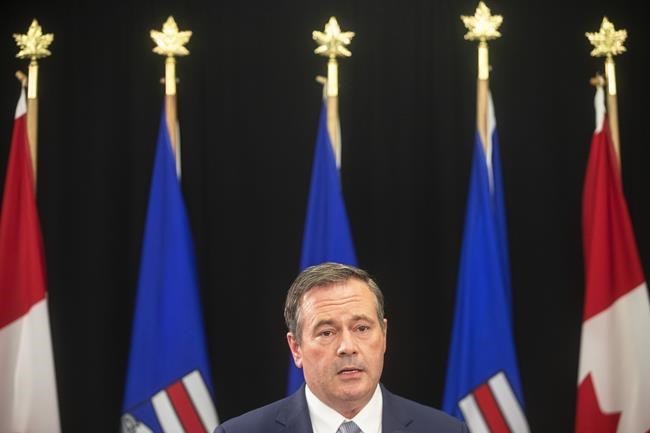EDMONTON — Alberta Premier Jason Kenney says the province has delivered a powerful message to the federal government on fiscal unfairness by voting in favour of scrapping the principle of equalization.
“Albertans have always been proud to share much of their good fortune with the rest of the country,” Kenney said Tuesday after Elections Alberta delivered the final results on a provincewide vote held last week.
“All we have asked for and what we are saying with these referendum results is that we must have a fair deal.”
The final results from Alberta’s equalization referendum revealed 61.7 per cent of those who voted want to see the principle of equalization removed from the Constitution.
A second referendum question to keep daylight time year-round failed by a whisker: 50.2 per cent to 49.8 per cent.
The votes were held on Oct. 18 in conjunction with municipal and school board elections across the province.
Equalization sees some tax money collected by the federal government redistributed from wealthier provinces to lower-income ones to ensure a basic level of service for all.
Alberta estimates it pays about $20 billion a year to the equalization program.
All but a small fraction of districts voted to remove equalization.
Calgary voted 58 per cent in favour of removing it, but Edmonton voted 52 per cent to leave equalization alone.
Kenney said Prime Minister Justin Trudeau is bound by legal precedent to address Alberta’s concerns, based on the Supreme Court’s 1998 decision on the Quebec secession reference.
Legal scholars dispute whether it applies, but the court did rule the catalyst is a “clear majority” on a “clear question.”
Kenney said he believes the result — 62 per cent on 39 per cent turnout – meets that standard.
“Over a million Albertans voted. That’s not a small portion. We’ve had provincial elections before with turnout as low as about 42 per cent, so this is in that range,” he said.
The path forward is unclear.
Trudeau, asked last week about the vote, appeared to throw cold water on any negotiations.
He said changing the Constitution on equalization can only be done with "significant consensus" involving Ottawa working with seven provinces or territories representing more than 50 per cent of the population.
Kenney has said while the vote was about removing equalization, he actually wants to use it as leverage to amend the equalization formula and address a range of federal transfers he feels are unfair to Alberta.
“If the federal government comes back and says they’re unwilling to put forward a constitutional amendment in the federal parliament, then we will move forward with our broader demand for change,” he said.
Kenney has also railed against a federal tanker ban on the northern B.C. coast and on federal environmental reviews of energy megaprojects that Alberta deems a dangerous and onerous overreach.
Opposition NDP Leader Rachel Notley said Alberta does need a better deal with Ottawa but the United Conservative premier and a muddled message are not the answer.
“One in four Albertans voted yes for a referendum question that even the premier told Albertans to ignore the substance of. That actually weakens Alberta’s argument,” said Notley.
“Jason Kenney himself is a flawed messenger to carry any kind of argument from Alberta to the rest of Canada. He is one of the least trusted public figures in the entire country.”
Political scientist Duane Bratt said the verdict was workable but undermined somewhat by low voter turnout.
“It’s much weaker than I think (Kenney) wanted it to be, but 62 — that’s pretty good,” said Bratt, with Mount Royal University in Calgary.
Bratt said Kenney continues to struggle in his messaging when he tries to conflate the referendum result on one clear constitutional question with a mandate to negotiate broader grievances around all transfers and federal policies.
Calgary-based pollster Janet Brown said her surveys have generally found strong support in Alberta for changing the equalization formula but not for dumping the whole program.
She said Kenney may have given Trudeau an out by asking a referendum question tied directly to constitutional change – something that requires buy-in from other provinces.
“I think by asking the question the way they did, it makes it easy for Trudeau to dismiss Kenney,” she said.
This report by The Canadian Press was first published Oct. 26, 2021.
Dean Bennett, The Canadian Press



